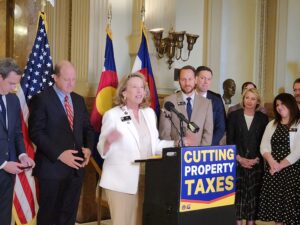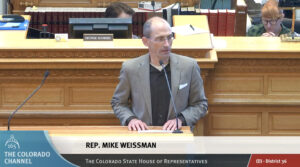After considering several options to reduce the business-personal-property tax burden, Colorado legislators appear interested in backing a plan that would nix a rarely used tax break and create a new benefit focused on smaller companies.
Late last month, the Legislative Oversight Committee Concerning Tax Policy advanced five proposals to Legislative Council, which will meet next week to determine which of those and of other interim-committee suggestions will be introduced as bills in the 2025 session. And while committee members declined to advance either of two BPPT-specific proposals it earlier had discussed, they did agree to incorporate one of those proposals into an omnibus bill that would make myriad changes to state tax law.
That proposal would keep in place the current exemption for businesses owning $52,000 or less worth of personal property — any equipment used in an office or factory, ranging from desks to heavy machinery — having to pay any business personal property taxes. The cutoff for the exemption rises annually based on inflation.
However, it would allow companies that own more than that amount of equipment, ranging up to those owning $150,000 worth of business personal property, to apply for a new tax credit. That would replace an existing tax credit that any firms required to remit business personal property taxes can take on their first $18,000 worth of equipment — a credit claimed by only 425 business owners for tax year 2021, in part due to its complexity.
Why a business personal property tax break is needed
Rep. Lisa Frizell, a Castle Rock Republican who’s led the charge on the committee to put forward a more effective break for companies paying the onerous business personal property tax, said this would offer employers help in a fiscally responsible way. Operators particularly despise the BPPT because it is an ongoing tax they must continue to pay on depreciating property, regardless of the amount of income they are making.

Sen. Lisa Frizell speaks at a Capitol news conference in May announcing a property-tax-cut bill that later passed the Legislature and became law.
“The business personal property tax is extremely unpopular in the business community, but it’s become a tax that’s relied on heavily by our local governments, some more than others,” Frizell said, noting the high percentage of local revenues it can generate in more rural, natural-resources-producing areas. “This bill is targeting small business owners.”
The new tax break also would help to address a particular pain point with the BPPT for many businesses — the fact that it doesn’t allow depreciation of property value beyond 30%, regardless of age of the equipment, said Sen. Chris Hansen, D-Denver. The size of the new credit would be determined by multiplying the $150,000 threshold by the assessment rate for personal property and then multiplying by the average mill levy imposed on personal property across the state, according to a fiscal note.
“For many small businesses that are heavy on equipment, that can be very polarizing,” Hansen, who formerly owned a renewable-energy company, said of the depreciation cap. “So, I think this is an area where there’s a lot of bipartisan interest to make some progress.”
Budget crunch could present trouble
Frizell opted to advance the tax-credit proposal over a separate bill proposal she’s had drafted that would simply have raised the exemption threshold level for paying any business personal property taxes from $52,000 to $75,000. Because it would have expanded an exemption on paying taxes to local governments, that bill would have cost cities, counties and special districts money and forced the Legislature to backfill school districts about $2.2 million a year when fully implemented.
While the advancing proposal would cost only the state government revenue because it’s written as a tax credit, its impact on tax collections could be even higher. Colorado Legislative Council estimated the tax credit will cost the state between $900,000 and $5.3 million annually — a wide range reflecting a lack of knowledge on how many more businesses will claim it as compared to the sparsely used existing tax credit.
And that price tag will be the biggest impediment to bipartisan support in the Legislature.

Colorado state Rep. Mike Weissman speaks on the House floor in May 2023.
Because of a variety of factors, including another expected year of higher-than-budgeted Medicaid spending and an expected drop in corporate income-tax revenues reflecting shrinking profit margins, legislators face a shortfall in their upcoming budget. Mark Ferrandino, director of Gov. Jared Polis’ Office of State Planning and Budgeting, told the Joint Budget Committee on Sept. 19 it will be about $1 billion short of funding promised services in the fiscal year that begins on July 1 after accounting for inflation and increases in caseload.
Progressive opposition to business personal property tax break
And that situation appeared to weigh heavily on the lone member of the interim tax-policy committee who did not support the proposed new tax credit — Democratic Rep. Mike Weissman of Aurora. Weissman, whose words carry significant weight with the progressive wing of his party and who is virtually guaranteed to win an open Senate seat in November in a highly partisan district, said the Legislature must be very cautious about taking more money out the budget.
“We were able to put some pretty big things into play last year,” Weissman said, pointing to a major boost in the earned income tax credit that officials approved because they had greater flexibility with rising tax revenues. “Because of the revenue forecast, we are not in that same position this year … I believe budget prudence will be paramount.”
Business leaders argue in turn that company owners dealing with inflation, rising labor costs and increasing regulatory compliance requirements face the same crunch as the Legislature. And, they say, every dollar that must go to paying business personal property taxes represents money that can’t go to hiring workers or replacing outdated equipment, especially when the BPPT is likely to increase their tax bills even further on new equipment.
